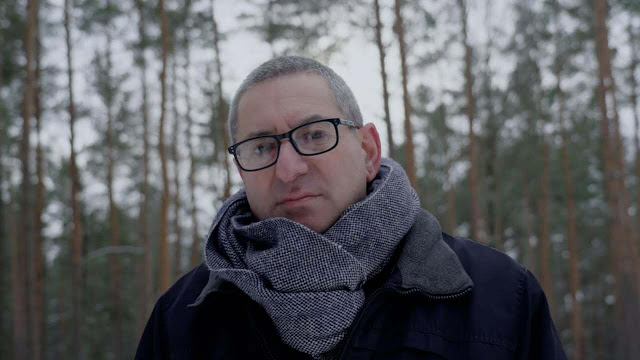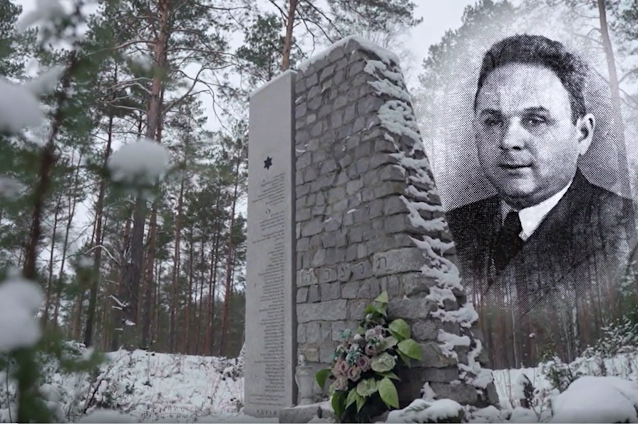 |
| Michael Zev Gordn at site of his grandfather’s murder in Summer 1941 (image from DW video). |
Any human calamity raises thoughts about how such events might be referred to in music, and how an essentially abstract art might relate to such acts. And when we are talking about something like the Holocaust then the rational mind rather quails. The subject is difficult for those of us for whom the event is history but is rendered all the more complex when family ties link directly. On 25 March 2025, the Britten Sinfonia will premiere Michael Zev Gordon‘s A Kind of Haunting, a work which arose directly out of Michael’s family’s experience of the Holocaust.
The work is a large-scale piece for two narrators, baritone and string orchestra which uses words both by leading Holocaust memory scholar Marianne Hirsch and poet Jacqueline Saphra. Michael describes it as a somewhat hybrid piece for the relatively unusual combination of spoken word, sung word and music and he comments that the work’s predecessors are rare. Prime amongst these must be Schoenberg’s 1948 work, A Survivor from Warsaw and Copland’s Lincoln Portrait (from 1942), along with such works as Walton’s Facade and Stravinsky’s The Soldier’s Tale. However, Michael adds that the combination of spoken and sung texts is relatively unusual. Michael chose the form because he wanted to come at the subject in a layered way.
He admits that he has thought of addressing the Holocaust in music in the past but has each time put the work to one side, finding it difficult if not impossible. He was drawn to it again thanks to his family’s own story. His Grandmother’s memoir, written in Yiddish, opened the door to his present approach to the Holocaust. His grandfather, Zalman, was killed in a forest north-east of Warsaw, one of the approximately 1.5 million Jews killed during the operation often called the ‘Holocaust by Bullets’. This provided a way to think about the Holocaust more directly, allowing Michael to trace more of what happened to his Grandfather.
 |
| Image of Michael Zev Gordon’s Grandfather, Zalman & memorial to those killed in the forest |
He feels that there is a parallel between his piece and Bach’s Passions, the commonality of a structure used to tell a story (recitative) with moments (arias) where you step back to reflect on the story and emotion. Yet, whilst Michael’s piece does tell his Grandfather’s story, the piece is as much about the suppression of the story that Michael lived as Michael’s father never shared the story. Thus the work becomes as much about memory and the suppression of memory, and as such Michael feels that though it deals with the Holocaust, it could be any traumatic event. The work is about growing up with the suppression of the memory, of things being pushed away and wishing to find out more, finally finding out and telling the story.
For the last 20 years or so, much of Michael’s music has had to do with memory, the way we feel it, the way it can be powerful, the experience of losing it and regaining it. 20 years ago he wrote a piano piece, On Memory [available on Andrew Zolinsky’s disc of Michael’s music on NMC], where each movement explores the idea of memory and its processes. Michael refers to Robert Schumann providing a musical model in his song cycles, where his able to explore and express the power and poignancy of memory, including leaving things out.
So, thinking about the Holocaust and his family’s story, Michael felt that he could do something about memory, what it is to remember or have memories of the Holocaust. Exploring what it is to carry suppressed memories and silences, reflecting trauma many years later. It is these subtle and quietly shrouded things that he traces, his music expresses fragile feelings. There is a story. The piece maps Michael’s own realisation of the need to return to the place where his Grandfather was killed. Something he did in September 2022, when he saw traces in the forest. So, Michael’s piece is not so much about the Holocaust, but about approaching the subject, with suppressed memories. Michael found the process difficult and he refers to the quotation from Adorno (possibly) about the barbarism of writing poetry after Auschwitz. Michael admits that he would not have wanted to treat the subject directly the way Schoenberg does in A Survivor from Warsaw.
Ultimately, he feels that his piece is about what it is to inherit trauma. You can hear more from Michael in an interview for the Deutsche Welle website that he gave from the site of his grandfather’s murder [see DW website]
Any composer trying to express personal things turns it into music that can be received in all sorts of ways. Out of the subject, Michael has made a piece of drama full of different levels of emotion and emotional connections. It can be heard simply as music, but music possesses the ability to start from a particular place but then turn into its absolute self. In this contact, Bach is the prime example, but Michael also refers to Puccini’s Tosca which starts in the particular but goes on to create extraordinarily powerful music. Though writing about pain and suffering, you can see that music can act as catharsis, pointing to something beyond the subject.
Michael emphasises that the work is very much a collaboration. Firstly, there are his own words, telling his story. Then there are words by Marianne Hirsch which comment on what it is to inherit memory, something she calls post-memory, that feels like memory but is not our memory. And at the close of the piece, they felt it important to say something about the suffering of the victims staying with them in their place of rest so that we can move beyond and find our place of rest. And Michael hopes that he can find catharsis beyond the piece. There are also words by the British Jewish poet, Jacqueline Saphra whose extremely poignant poetry picks up on Michael and Marianne Hirsch’s ideas and reflects them back into the audience using another kind of language. For Michael, it was rather wonderful that Jacqueline Saphra helped to bind the subject together.
The piece is composed of several elements pulling together to create more than the sum of their parts. Michael felt this was the best way to approach the subject. It last around 45 minutes and the music is almost constant, the spoken text being heard largely as melodrama. When we spoke, Michael had finished the piece but admitted that it was still on his desk and he was tweaking it.
It has been an enormously intense, personal experience to write A Kind of Haunting, different to any of Michael’s previous composing. He feels that he won’t return, perhaps does not need to return to its subject again. But he is sure that, one way or another, he will continue to write music connected with other Jewish subjects, and to continue to explore what it is to be, as he sees himself, a British Jewish composer.
Michael Zev Gordon’s A Kind of Haunting will be premiered in a programme alongside Martinů’s 1938 Concerto for Double String Orchestra, Piano and Timpani to Strauss’s elegiac Metamorphosen, written in 1945, performed by Britten Sinfonia, conductor Jonathan Berman with baritone James Newby and narrators Allan Corduner and Louisa Clein.
There are performances on 25 March at Milton Court, London, 26 March, at Elgar Concert Hall, Birmingham and 28 March at Saffron Hall, Essex. Full details from the Britten Sinfonia website.
The blog is free, but I’d be delighted if you were to show your appreciation by buying me a coffee.
Elsewhere on this blog
- Letter from Florida: It is hard to imagine any orchestra getting closer to playing as one, though, than The Cleveland Orchestra – concert review
- A woman on the edge: Cherubini’s Médée in the original French version yet given a powerful modern twist with Joyce El-Khoury – opera review
- To create modern culture through the thoughts of the past: George Petrou artistic director of the Göttingen International Handel Festival introduces this year’s festival – interview
- Another crazy day: Joe Hill-Gibbins’ production of Mozart’s The Marriage of Figaro returns to ENO reinvigorated – opera review
- My Heart’s in the Highlands: the debut recital from tenor Glen Cunningham mixes Stuart MacRae’s new songs with other composers with ‘Scotland in Mind’ – record review
- Unbearable intensity: musically strong revival of Janáček’s Jenůfa at the Royal Opera with incoming music director Jakub Hrůša on searing form in the pit – opera review
- Schubert’s Birthday at Wigmore Hall: Konstantin Krimmel in overwhelming form, with a welcome group of Carl Loewe too – concert review
- Bruckner’s obsession with death, Scottish Gaelic folk poetry & a grumpy gaboon: Scottish composer Jay Capperauld, Scottish Chamber Orchestra’s associate composer – interview
- Letter from Florida: a study in contrasts, Gounod’s Roméo et Juliette at Palm Beach Opera – opera review
- 1775 – A Retrospective: Ian Page & The Mozartists on terrific form in a deep dive into the sound-world of Mozart’s 1775 – concert review
- Home








